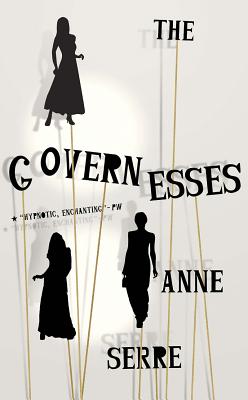Book Review: Female Sexuality — From a Woman’s Point of View
By Sophie Lellman
Neither narrative proffers an uplifting tale of female empowerment, but that is precisely their strength.
Adele by Leila Slimani. Translated from the French by Sam Taylor, Penguin Books, 240 pages, $16.
The Governesses by Anne Serre. Translated from the French by Mark Hutchinson, New Directions, 112 pages, $12.95.

Over the centuries, the relationship between women and sex in literature has been, to say the least, fraught. Through the pens of men, women have often been reduced to the hypersexual or asexual tropes of the whore and the madonna. But, since the late nineteenth century, female writers have asserted their views of female sexuality. I am thinking in particular of Kate Chopin’s 1899 novel The Awakening, the story of a woman who discovers her sexuality along with her independence. Since then, much of women’s writing on sexuality has worked to reclaim female sexual agency, envisioning women as active sexual beings. But such a picture has been, at times, oversimplified. Two French books recently translated into English considerably complicate the picture.
Leila Slimani’s Adele follows the eponymous central character as she navigates her uncontrollable desire for sex within the confines of her marriage and family. At a recent reading in Boston, Slimani explained that her intention was to explore sexual addiction — commonly seen as a man’s problem — from a woman’s perspective. In today’s sex-positive climate, pathologizing the sexuality of a woman would seem to be a risky choice. Done carelessly, such a subject might read as a condemnation of highly sexual women. However, Slimani’s masterful treatment of the subject makes it clear that this novel is not about shaming women for their desires but about exploring the complexity of women’s sexuality.
Adele works at a job she does not enjoy, has few close friends. She loves her husband Richard and her son Lucien, but feels no attraction to Richard and finds Lucien “a burden, a constraint that she struggles to get used to.” Torn between the excitement of new conquests and the stability Richard affords her, Adèle vows many times to give up her affairs and devote herself to marriage and motherhood. After a night out that leaves a bad taste in her mouth, Adèle swears that “tomorrow she will make dinner. She’ll clean the house, she’ll buy flowers. She’ll drink wine with him and tell him about her day. She’ll make plans for the weekend. She will be conciliatory, gentle, servile. She’ll say yes to everything.” But she rarely sticks to her commitment to making changes. Slimani perfectly captures the patterns of addiction, from binges to relapses to attempts at recovery. Adèle is as much a meditation on the erotic restrictions of modern society as it is an investigation of addiction.
Anne Serre’s 1992 novel The Governesses was translated for the first time into English in 2018. This slim novel immerses readers in the dreamlike world of three French governesses, Eléonore, Laura, and Inès. Seemingly as unconcerned with their charges as they are with the world outside their employers’ gates, the women are carefree — they find pleasure in wandering about the woods and lying in the sun. Their lives are suspended in space and time, like water drops caught in amber — their sphere of enjoyment is free of any real world pressures. The book reads as a feminist fantasy, where women satisfy their sexual needs free from society’s opprobrium. Despite their many and various encounters with men, “there’s nothing venal or flighty, nothing in the least bit unsavory, about the governesses. No unfortunate rumor has ever tarnished their reputation,” writes Serre.
 Readers may find themselves both titillated and discomfited by the conduct of Eléonore, Laura, and Inès. The trio take pleasure in their sexual escapades both individually and as a group, in being watched, and in the excitement of the chase. This representation of women as pursuers is unusual and therefore, perhaps, feminist, yet I found that Serre takes the pursuit of the sensual to disturbing lengths. When a young man enters their gates, the governesses are “not going to let him vanish like that. He walked into the trap of their vast, lunar privacy; they get their nets out, they’re going to capture him and keep him there…He’s there, panting, gasping for breath as he crashes around; he’s more or less stopped crashing, in fact. He’s going to surrender. He can’t take it anymore.” What follows amounts to rape.
Readers may find themselves both titillated and discomfited by the conduct of Eléonore, Laura, and Inès. The trio take pleasure in their sexual escapades both individually and as a group, in being watched, and in the excitement of the chase. This representation of women as pursuers is unusual and therefore, perhaps, feminist, yet I found that Serre takes the pursuit of the sensual to disturbing lengths. When a young man enters their gates, the governesses are “not going to let him vanish like that. He walked into the trap of their vast, lunar privacy; they get their nets out, they’re going to capture him and keep him there…He’s there, panting, gasping for breath as he crashes around; he’s more or less stopped crashing, in fact. He’s going to surrender. He can’t take it anymore.” What follows amounts to rape.
Neither narrative proffers an uplifting tale of female empowerment, but that is precisely their strength. The ways in which sexuality can be destructive are not often explored in women’s literature; for good reason, given the plethora of “whore” narratives found (usually) in male-authored fiction. What is striking here is that the women characters, though highly sexual, are not demonized. It is Adele’s addiction — not her ‘immorality’ — that drives her self-destructive behavior. In the case of the governesses, society does not condemn their aggressive exploits (perhaps, in some cases, it should). Building on earlier feminist writing, these two engaging French novels add welcome nuance (admittedly with touches of the extreme) to a rich tradition of writing on women’s sexuality.
Sophie Lellman graduated from Macalester College with a BA in Linguistics. She is currently working on literary translation from Portuguese.
